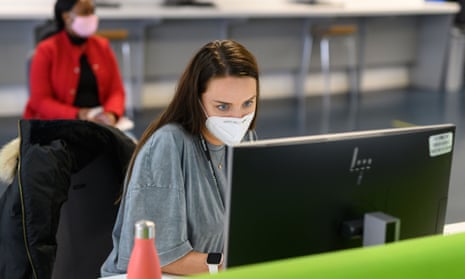The pandemic is still taking its toll on UK university students’ mental health, experts are warning, as figures show that growing numbers are seeking help from peer-run helplines for anxiety, depression and suicidal thoughts.
Nightline, which is staffed by anonymous student volunteers, said it had recorded a 51.4% increase in calls in 2020-21, and that this has grown since, with early data suggesting numbers for 2021-22 were 30% higher, and up a further 23% since the new academic year began.
The helpline, which has been running for more than 50 years, said there had been a significant increase in callers discussing stress and anxiety, reaching 10.9%. This has risen to 17% since September, including a rise in calls from students worried about their finances.
Despite a small reduction in calls from students attempting suicide, Nightline recorded an increase in the number expressing suicidal thoughts, which has risen even higher this year, reaching 7.4% of calls.
Jennifer Smith, the policy manager at the charity Student Minds, said “the vast majority” of students had experienced “significant disruption in their lives”, missing out on key social, academic and personal milestones, which had left them feeling “grief, loss, uncertainty and a lack of confidence”.
“Current students experienced the transition into higher education very differently from their predecessors, and may feel underprepared for university life,” she said, adding that the pandemic remained a “real, very current challenge” for immunocompromised students, carers and those on healthcare courses.
Matt Jones, a PhD student at Loughborough University who has depression, anxiety and autism, called Nightline six months ago because he felt “overwhelmed” by the barrage of stressful world events and readjusting to socialising after two years of reduced contact and isolation.
“I’ve sat down with friends and we’ve all said ‘The pandemic screwed us.’ Suddenly we don’t know how to deal with [normal life],” he said.
“Locking everyone away for a year had a wide impact on people’s ability to connect interpersonally. If you look at freshers, they lost their 15- to 17-year-old years, which is when you do a lot of growth – you lose all those experiences.”
Jones, who runs his university’s Nightline service, thinks we live in an especially anxiety-inducing era for young people, as social media makes them feel more connected with world events – for example, watching TikTok clips shifting from pictures of murdered Ukrainian soldiers to videos of friends. He said there was also pressure to have well-informed opinions on everything, or risk social media shaming.
after newsletter promotion
“There’s this feeling of ‘We’re fed up of living through history.’ We’re fed up of living through big events, whether it’s Covid or the January insurrection or the war in Ukraine. If you talk to students, more than anything else, it’s ‘Can we have a year where nothing happens? Can we have a year of sanity and calmness?’”
He added that more students phoning Nightline was also a positive sign. “Sometimes [my generation] can come across as being more needy, but I don’t think that’s true, we’re just better at understanding what we need to do to help ourselves and communicating our needs.”
Dominique Thompson, an NHS doctor and author of student wellbeing books, said most studies of students’ emotional wellbeing post pandemic showed higher anxiety and increased loneliness.
She said anxiety and suicidal thoughts tended to reflect feeling out of control of your life and future – all of which had been heightened by the pandemic, recession and cost of living crisis.
“Anxiety continues to be driven by uncertainty about the world they live in, whether that is future opportunities, eco anxiety or political concerns, alongside day-to-day worries about cost of living, academic pressure and making friends. We cannot underestimate how important all these issues are for young adults, and how powerless they feel when faced with such huge challenges,” she said.
Rachel Sandby-Thomas of the Association of Heads of University Administration said universities were aware of the impact the pandemic has had on students, and were developing and improving mental health support, including staff training on spotting warning signs early, and partnering with the NHS on professional treatment.
In the UK and Ireland, Samaritans can be contacted on 116 123 or email jo@samaritans.org or jo@samaritans.ie. In the US, the National Suicide Prevention Lifeline is 1-800-273-8255. In Australia, the crisis support service Lifeline is 13 11 14. Other international helplines can be found at www.befrienders.org.
